- Home
- E. F. Benson
The Complete Mapp & Lucia Page 4
The Complete Mapp & Lucia Read online
Page 4
Georgie had had wonderful views.
“That very day,” he said, “soon after lunch, I was looking for a letter I thought I had left in my bedroom, and happening to glance out, I saw the Indian sitting under Mrs Quantock’s pear-tree. He was swaying a little backwards and forwards.”
“The brandy!” said Lucia excitedly. “He has his meals in his own room.”
“No, amica, it was not the brandy. In fact I don’t suppose the brandy had gone to Mrs Quantock’s then, for he did not take it from Rush’s, but asked that it should be sent….” He paused a moment—”Or did he take it away? I declare I can’t remember. But anyhow when he swayed backwards and forwards, he wasn’t drunk, for presently he stood on one leg, and crooked the other behind it, and remained there with his hands up, as if he was praying, for quite a long time without swaying at all. So he couldn’t have been tipsy. And then he sat down again, and took off his slippers, and held his toes with one hand, while his legs were quite straight out, and put his other hand round behind his head, and grasped his other ear with it. I tried to do it on my bedroom floor, but I couldn’t get near it. Then he sat up again and called ‘Chela! Chela!’ and Mrs Quantock came running out.”
“Why did he say ‘Chela’?” asked Lucia.
“I wondered too. But I knew I had some clue to it, so I looked through some books by Rudyard Kipling, and found that Chela meant ‘Disciple.’ What you have told me just now about ‘Guru’ being ‘teacher,’ seems to piece the whole thing together.”
“And what did Daisy do?” asked Mrs Lucas breathlessly.
“She sat down too, and put her legs out straight in front of her like the Guru, and tried to hold the toe of her shoe in her fingers, and naturally she couldn’t get within yards of it. I got nearer than she did. And he said, ‘Beloved lady, not too far at first.’”
“So you could hear too,” said Lucia.
“Naturally, for my window was open, and as you know Mrs Quantock’s pear-tree is quite close to the house. And then he told her to stop up one nostril with her finger and inhale through the other, and then hold her breath, while he counted six. Then she breathed it all out again, and started with the other side. She repeated that several times and he was very much pleased with her. Then she said, ‘It is quite wonderful; I feel so light and vigorous.’”
“It would be very wonderful indeed if dear Daisy felt light,” remarked Lucia. “What next?”
“Then they sat and swayed backwards and forwards again and muttered something that sounded like Pom!”
“That would be ‘Om’, and then?”
“I couldn’t wait any longer for I had some letters to write.”
She smiled at him.
“I shall give you another cup of tea to reward you for your report,” she said. “It has all been most interesting. Tell me again about the breathing in and holding your breath.”
Georgie did so, and illustrated in his own person what had happened. Next moment Lucia was imitating him, and Peppino came round in order to get a better view of what Georgie was doing. Then they all sat, inhaling through one nostril, holding their breath, and then expelling it again.
“Very interesting,” said Lucia at the end. “Upon my word, it does give one a sort of feeling of vigour and lightness. I wonder if there is something in it.”
Chapter THREE
Though “The Hurst” was, as befitted its Chatelaine, the most Elizabethanly complete abode in Riseholme, the rest of the village in its due degree, fell very little short of perfection. It had but its one street some half mile in length but that street was a gem of mediaeval domestic architecture. For the most part the houses that lined it were blocks of contiguous cottages, which had been converted either singly or by twos and threes into dwellings containing the comforts demanded by the twentieth century, but externally they preserved the antiquity which, though it might be restored or supplemented by bathrooms or other conveniences, presented a truly Elizabethan appearance. There were, of course, accretions such as old inn signs above front-doors and old bell-pulls at their sides, but the doors were uniformly of inconveniently low stature, roofs were of stone slabs or old brick, in which a suspiciously abundant crop of antirrhinums and stone crops had anchored themselves, and there was hardly a garden that did not contain a path of old paving-stones, a mulberry-tree and some yews cut into shape.
Nothing in the place was more blatantly mediaeval than the village green, across which Georgie took his tripping steps after leaving the presence of his queen. Round it stood a row of great elms, and in its centre was the ducking-pond, according to Riseholme tradition, though perhaps in less classical villages it might have passed merely for a duck-pond. But in Riseholme it would have been rank heresy to dream, even in the most pessimistic moments, of its being anything but a ducking-pond. Close by it stood a pair of stocks, about which there was no doubt whatever, for Mr Lucas had purchased them from a neighbouring iconoclastic village, where they were going to be broken up, and, after having them repaired, had presented them to the village-green, and chosen their site close to the ducking pond. Round the green were grouped the shops of the village, slightly apart from the residential street, and at the far end of it was that undoubtedly Elizabethan hostelry, the Ambermere Arms, full to overflowing of ancient tables and bible-boxes, and fire-dogs and fire-backs, and bottles and chests and settles. These were purchased in large quantities by the American tourists who swarmed there during the summer months, at a high profit to the nimble proprietor, who thereupon purchased fresh antiquities to take their places. The Ambermere Arms in fact was the antique furniture shop of the place, and did a thriving trade, for it was much more interesting to buy objects out of a real old Elizabethan inn, than out of a shop.
Georgie had put his smart military cape over his arm for his walk, and at intervals applied his slim forefinger to one nostril, while he breathed in through the other, continuing the practice which he had observed going on in Mrs Quantock’s garden. Though it made him a little dizzy, it certainly produced a sort of lightness, but soon he remembered the letter from Mrs Quantock which Lucia had read out, warning her that these exercises ought to be taken under instruction, and so desisted. He was going to deliver Lucia’s answer at Mrs Quantock’s house, and with a view to possibly meeting the Guru, and being introduced to him, he said over to himself “Guru, Guru, Guru” instead of doing deep breathing, in order to accustom himself to the unusual syllables.
It would, of course, have been very strange and un-Riseholme-like to have gone to a friend’s door, even though the errand was so impersonal a one as bearing somebody else’s note, without enquiring whether the friend was in, and being instantly admitted if she was, and as a matter of fact, Georgie caught a glimpse, when the knocker was answered (Mrs Quantock did not have a bell at all), through the open door of the hall, of Mrs Quantock standing in the middle of the lawn on one leg. Naturally, therefore, he ran out into the garden without any further formality. She looked like a little round fat stork, whose legs had not grown, but who preserved the habits of her kind.
“Dear lady, I’ve brought a note for you,” he said, “it’s from Lucia.”
The other leg went down, and she turned on him the wide firm smile that she had learned in the vanished days of Christian Science.
“Om,” said Mrs Quantock, expelling the remainder of her breath. “Thank you, my dear Georgie. It’s extraordinary what Yoga has done for me already. Cold quite gone. If ever you feel out of sorts, or depressed or cross you can cure yourself at once. I’ve got a visitor staying with me.”
“Have you indeed?” asked Georgie, without alluding to the thrilling excitements which had trodden so close on each other’s heels since yesterday morning when he had seen the Guru in Rush’s shop.
“Yes; and as you’ve just come from dear Lucia’s perhaps she may have said something to you about him, for I wrote to her about him. He’s a Guru of extraordinary sanctity from Benares, and he’s teaching me the Way. You shall see him too
, unless he’s meditating. I will call to him; if he’s meditating he won’t hear me, so we shan’t be interrupting him. He wouldn’t hear a railway accident if he was meditating.”
She turned round towards the house.
“Guru, dear!” she called.
There was a moment’s pause, and the Indian’s face appeared at a window.
“Beloved lady!” he said.
“Guru dear, I want to introduce a friend of mine to you,” she said. “This is Mr Pillson, and when you know him a little better you will call him Georgie.”
“Beloved lady, I know him very well indeed. I see into his clear white soul. Peace be unto you, my friend.”
“Isn’t he marvellous? Fancy!” said Mrs Quantock, in an aside.
Georgie raised his hat very politely.
“How do you do?” he said. (After his quiet practice he would have said “How do you do Guru?” but it rhymed in a ridiculous manner and his red lips could not frame the word.) “I am always well,” said the Guru, “I am always young and well because I follow the Way.”
“Sixty at least he tells me,” said Mrs Quantock in a hissing aside, probably audible across the channel, “and he thinks more, but the years make no difference to him. He is like a boy. Call him ‘Guru.’”
“Guru,—” began Georgie.
“Yes, my friend.”
“I am very glad you are well,” said Georgie wildly. He was greatly impressed, but much embarrassed. Also it was so hard to talk at a second-story window with any sense of ease, especially when you had to address a total stranger of extraordinary sanctity from Benares.
Luckily Mrs Quantock came to the assistance of his embarrassment.
“Guru dear, are you coming down to see us?” she asked.
“Beloved lady, no!” said the level voice. “It is laid on me to wait here. It is the time of calm and prayer when it is good to be alone. I will come down when the guides bid me. But teach our dear friend what I have taught you. Surely before long I will grasp his earthly hand, but not now. Peace! Peace! and Light!”
“Have you got some Guides as well?” asked Georgie when the Guru disappeared from the window. “And are they Indians too?”
“Oh, those are his spiritual guides,” said Mrs Quantock, “He sees them and talks to them, but they are not in the body.”
She gave a happy sigh.
“I never have felt anything like it,” she said. “He has brought such an atmosphere into the house that even Robert feels it, and doesn’t mind being turned out of his dressing-room. There, he has shut the window. Isn’t it all marvellous?”
Georgie had not seen anything particularly marvellous yet, except the phenomenon of Mrs Quantock standing on one leg in the middle of the lawn, but presumably her emotion communicated itself to him by the subtle infection of the spirit.
“And what does he do?” he asked.
“My dear, it is not what he does, but what he is,” said she. “Why, even my little bald account of him to Lucia has made her ask him to her garden-party. Of course I can’t tell whether he will go or not. He seems so very much—how shall I say it?—so very much sent to Me. But I shall of course ask him whether he will consent. Trances and meditation all day! And in the intervals such serenity and sweetness. You know, for instance, how tiresome Robert is about his food. Well, last night the mutton, I am bound to say, was a little underdone, and Robert was beginning to throw it about his plate in the way he has. Well, my Guru got up and just said, ‘Show me the way to kitchen’—he leaves out little words sometimes, because they don’t matter—and I took him down, and he said ‘Peace!’ He told me to leave him there, and in ten minutes he was up again with a little plate of curry and rice and what had been underdone mutton, and you never ate anything so good. Robert had most of it and I had the rest, and my Guru was so pleased at seeing Robert pleased. He said Robert had a pure white soul, just like you, only I wasn’t to tell him, because for him the Way ordained that he must find it out for himself. And today before lunch again, the Guru went down in the kitchen, and my cook told me he only took a pinch of pepper and a tomato and a little bit of mutton fat and a sardine and a bit of cheese, and he brought up a dish that you never saw equalled. Delicious! I shouldn’t a bit wonder if Robert began breathing-exercises soon. There is one that makes you lean and young and exercises the liver.”
This sounded very entrancing.
“Can’t you teach me that?” asked Georgie eagerly. He had been rather distressed about his increasing plumpness for a year past, and about his increasing age for longer than that. As for his liver he always had to be careful.
She shook her head.
“You cannot practise it except under tuition from an expert,” she said.
Georgie rapidly considered what Hermy’s and Ursy’s comments would be if, when they arrived tomorrow, he was found doing exercises under the tuition of a Guru. Hermy, when she was not otter-hunting, could be very sarcastic, and he had a clear month of Hermy in front of him, without any otter-hunting, which, so she had informed him, was not possible in August. This was mysterious to Georgie, because it did not seem likely that all otters died in August, and a fresh brood came in like caterpillars. If Hermy was here in October, she would otter-hunt all morning and snore all afternoon, and be in the best of tempers, but the August visit required more careful steering. Yet the prospect of being lean and young and internally untroubled was wonderfully tempting.
“But couldn’t he be my Guru as well?” he asked.
Quite suddenly and by some demoniac possession, a desire that had been only intermittently present in Mrs Quantock’s consciousness took full possession of her, a red revolutionary insurgence hoisted its banner. Why with this stupendous novelty in the shape of a Guru shouldn’t she lead and direct Riseholme instead of Lucia? She had long wondered why darling Lucia should be Queen of Riseholme, and had, by momentary illumination, seen herself thus equipped as far more capable of exercising supremacy. After all, everybody in Riseholme knew Lucia’s old tune by now, and was in his secret consciousness quite aware that she did not play the second and third movements of the Moonlight Sonata, simply because they “went faster,” however much she might cloak the omission by saying that they resembled eleven o’clock in the morning and 3 p.m. And Mrs Quantock had often suspected that she did not read one quarter of the books she talked about, and that she got up subjects in the Encyclopaedia, in order to make a brave show that covered essential ignorance. Certainly she spent a good deal of money over entertaining, but Robert had lately made twenty times daily what Lucia spent annually, over Roumanian oils. As for her acting, had she not completely forgotten her words as Lady Macbeth in the middle of the sleep-walking scene?
But here was Lucia, as proved by her note, and her A. D. C. Georgie, wildly interested in the Guru. Mrs Quantock conjectured that Lucia’s plan was to launch the Guru at her August parties, as her own discovery. He would be a novelty, and it would be Lucia who gave Om-parties and breathing-parties and standing-on-one-leg parties, while she herself, Daisy Quantock, would be bidden to these as a humble guest, and Lucia would get all the credit, and, as likely as not, invite the discoverer, the inventress, just now and then. Mrs Quantock’s Guru would become Lucia’s Guru and all Riseholme would flock hungrily for light and leading to The Hurst. She had written to Lucia in all sincerity, hoping that she would extend the hospitality of her garden-parties to the Guru, but now the very warmth of Lucia’s reply caused her to suspect this ulterior motive. She had been too precipitate, too rash, too ill-advised, too sudden, as Lucia would say. She ought to have known that Lucia, with her August parties coming on, would have jumped at a Guru, and withheld him for her own parties, taking the wind out of Lucia’s August sails. Lucia had already suborned Georgie to leave this note, and begin to filch the Guru away. Mrs Quantock saw it all now, and clearly this was not to be borne. Before she answered, she steeled herself with the triumph she had once scored in the matter of the Welsh attorney.
“Dear
Georgie,” she said, “no one would be more delighted than I if my Guru consented to take you as a pupil. But you can’t tell what he will do, as he said to me today, apropos of myself, ‘I cannot come unless I’m sent.’ Was not that wonderful? He knew at once he had been sent to me.”
By this time Georgie was quite determined to have the Guru. The measure of his determination may be gauged from the fact that he forgot all about Lucia’s garden-party.
“But he called me his friend,” he said. “He told me I had a clean white soul.”
“Yes; but that is his attitude towards everybody,” said Mrs Quantock. “His religion makes it impossible for him to think ill of anybody.”
“But he didn’t say that to Rush,” cried Georgie, “when he asked for some brandy, to be put down to you.”

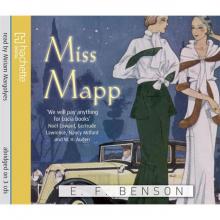 Miss Mapp
Miss Mapp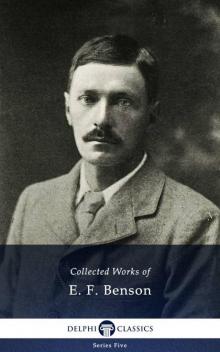 Works of E F Benson
Works of E F Benson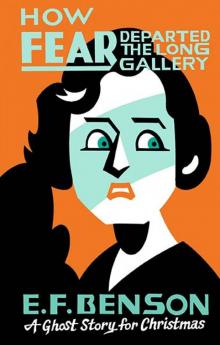 How Fear Departed the Long Gallery
How Fear Departed the Long Gallery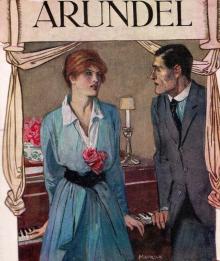 Dodo's Daughter: A Sequel to Dodo
Dodo's Daughter: A Sequel to Dodo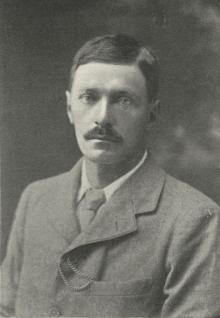 The House of Defence v. 1
The House of Defence v. 1 Queen Lucia
Queen Lucia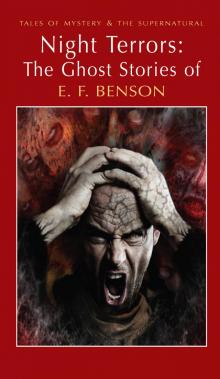 Night Terrors
Night Terrors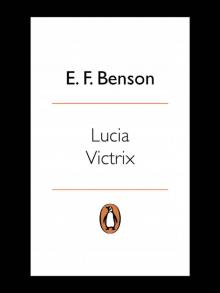 Lucia Victrix
Lucia Victrix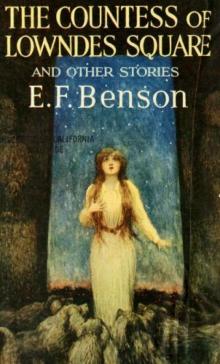 The Countess of Lowndes Square and Other Stories
The Countess of Lowndes Square and Other Stories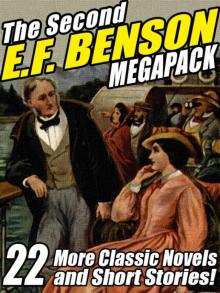 The Second E. F. Benson Megapack
The Second E. F. Benson Megapack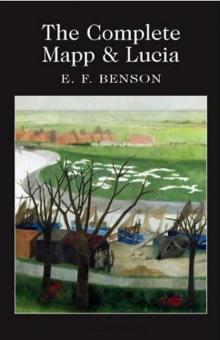 The Complete Mapp & Lucia
The Complete Mapp & Lucia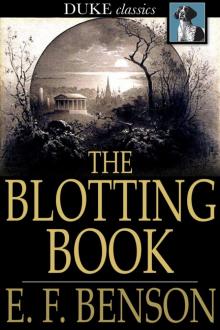 The Blotting Book
The Blotting Book The E. F. Benson Megapack
The E. F. Benson Megapack Lucia Rising
Lucia Rising Ghost Stories
Ghost Stories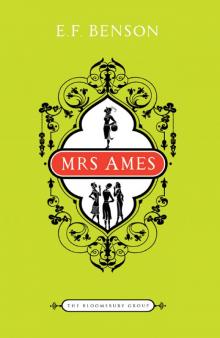 Mrs. Ames
Mrs. Ames E. F. Benson
E. F. Benson